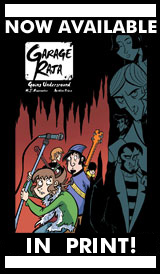An Ill-Formed Manifesto
Dave Sims’ Cerebus is awful. Not because it’s misogynistic (the number one sticking point that every critic seems to have with the series); not because it devolves into a number of abstruse philosophical screes about the nature of god. These are elements not introduced until well after the series has worn out its welcome with the Church and State story arc. Excepting the brilliant art and composition (though these, too, are amateurish and ugly until the end of the High Society story arc, nearly 1000 pages in) the series has nothing to recommend it. The narrative is a haphazardly constructed mess; characterization is nonexistent at best and nonsensical at worst, and what passes for humor is only childish spite and adolescent cynicism. Worst of all, the series’ thematic concerns – banal and ugly as they are — sabotage every element of the story and deprive it of the ability to maintain any kind of narrative cohesion. Far from being a masterpiece, Cerebus is nothing but the scribbling of a hateful, shallow soul.
First – and most fundamentally – Sims fails to properly define and develop his cast. Certainly it’s easy enough to rattle off the names of main characters – Cerebus, Jaka, Lord Julius, Astoria and Weishaupt – and to recognize their distinct designs. It is nearly impossible, though, to discern their motivations and their deeper characteristics. There’s no doubt that Cerebus is violent, prideful and petty. That Astoria is manipulative and cold, Lord Julius is conniving, Weishaupt ambitious. The problem is that they are rarely more developed than this. They are generally given one trait — always negative — and then the reader is expected to interpret all of their actions and character in light of this defining element with only the barest hope of future justification. Cerebus is so utterly misanthropic and so singularly obsessed with wealth and power that he seems almost tragic – one suspects there must be a deeper reason for his flaws — but all that’s ever revealed are deeper and deeper levels of his anger and avarice. He does not fight because he enjoys fighting, he fights to amass wealth. He amasses wealth in order to drink and he drinks to…? To numb some mental anguish, because he enjoys getting drunk, because he’s an alcoholic? It is never explained; there is the barest intimation that he drinks himself stupid out of loneliness, but it is expository and rings hollow. Cerebus’ actions, his dialogue, his history: none of these suggest that he is tormented by loneliness or that he desires emotional intimacy of any kind.
Other, similar attempts to develop characters are equally contrived, the results confusing. When Astoria, whose motivations remain enigmatic throughout High Society, finally reveals that she is only assisting Cerebus’ bid for governor in an attempt to secure women’s suffrage, it is baffling. This is not a motivation that has even been suggested, let alone shown, despite ample opportunities. Astoria is never seen interacting with other women, never voices any concern for their disenfranchisement or their plight (a plight that is never seen…). On the eve of Cerebus’ election as Prime Minister, in a rare moment where the reader is given direct insight into the minds of the cast, her head is filled not with images of the change Cerebus’ victory might signal but of sexual fantasies. The further – and much later — reveal that Astoria is the leader of the Kelvinist, a radical feminist religious sect that believes in female superiority, is so forced as to be insulting. Before this revelation she has never shown any distaste for men (despite being surrounded by them for hundreds of pages) any more than she’s ever shown a particular love for women. She is never shown to have any followers, her political power being a matter of finances. It’s not as though she has any reason to hide this information, either, considering she later voices it despite penalty of death. Her past actions make no sense in light of her future character and her past character makes no sense in light of her future actions. In attempting to develop characters Sims has only managed to muddle and confuse.
While this negligent method of characterization affects even the most minor of cast members – Professor Claremont, the wizard Henrot, a nameless artist and many more characters appear, disappear, then reappear mysteriously, shoved into new roles and personalities utterly at odds with their original depictions — its most unforgivable application concerns Cerebus’ romantic interest, Jaka. Originally a gag character, a bimbo whose seduction of Cerebus is played strictly for laughs, Jaka is initially treated as an utterly disposable side-character, one whom Cerebus forgets immediately. Yet when she appears again to confess her love to Cerebus some 500 pages later, their relationship has been recast. The tone of their reunion is oppressively somber, the lighting dark and dramatic and the characters drawn in an ultra-detailed manner. Cerebus not only remembers Jaka and the events of their meeting vividly, he expresses (in his clumsy way) some level of affection for her; she has thrown away everything in order to find and please Cerebus. The shift is so jarring that one cannot help but doubt his or her memory of that first encounter, only to find upon rereading that it was every bit as trite and silly as remembered. The result is one of the least convincing relationships in history. Jaka and Cerebus have no chemistry and a negligible history: their relationship is built on a narrative lie and so can only inspire contempt in the attentive reader. Sims’ attempt to morph the stuff of a Benny Hill skit into a Shakespearean tragedy is the narrative equivalent of forcing a square peg into a round hole. Such contrived writing makes it impossible to develop a real connection to characters and events; they are too plastic and ill-formed to understand, let alone know intimately. Furthermore, this undermines any confidence the reader can have in Sims, who has shown only a passing care for and attention to his own work.
This cynical indifference extends, naturally, to the equally slapdash plotting and pacing. What are eventually revealed to be pivotal actions and plot-points are often originally presented as throw-away gags or barely-there asides. When the Moon Roach murders the Grand Inquisitor, a character that the reader has only just been introduced to (and who is not even properly identified), by dropping a boulder upon him, the tone of the incident is strictly humorous. Only hundreds of pages later, in a wordy missive that signals a complete break in the action, is it revealed that this assassination was the trigger for the entire High Society plotline, a revelation in direct contradiction to what has been explicitly shown. “Unless one understands the sequence of events, in context, which led to the election, it becomes difficult to appreciate…â€Â  the narrator begins his expository letter, as though Sims, who has only just discovered that this was supposed to be a story about the intersection of religious and economic interests, can convincingly change trajectories with a muddled wall of text. The resultant conclusion is a jumbled mess that involves the political, economic and religious relationships between a number of countries and factions that readers are familiar with in name only. These abstract conflicts completely overshadow the much more concrete conflicts between Cerebus and Julius and between Cerebus and Astoria, conflicts at the heart of this story that, vague as they are, are at least grounded in motives and emotions the reader is familiar with firsthand. As a result, the resolution is not only rushed, unsatisfying and anti-climactic – happening almost entirely off-panel — it is lazy and dishonest, a narrative sleight of hand that renders hundreds of pages of development moot.
At other times, the plot will simply shift focus without even this much motivating force. Church and State, which begins as an exploration of Cerebus’ abuse of religious power (and, again, the intersection between politics and religion, as though this was the only thing Sims was interested in) inexplicably and abruptly turns into a competition for the role of God between Cerebus and a host of bizarre candidates, among them the unholy fusion of three very minor characters (who now act NOTHING like they did before), a throw-away gag character from 2000 pages before, two wizards (one of whom is brand-new but treated as though he were so established and familiar a presence that he is not even given the benefit of a name) and Astoria. Later, and again without warning, the competition is refocused so that now it becomes a matter of meeting with God in order to become his representative. When at last Cerebus does ascend to the moon, though, he finds not God but “the Judge,†a wordy, pontificating and omniscient moralizer who, despite infinite wisdom, espouses a philosophy no more complex than adolescent nihilism. Life, he reveals, is the product of cosmic rape and is therefore inherently violent. Because it began in violence and stupidity, it will continue and eventually end in violence and stupidity and that is that. Free-will is a lie meant to make suffering more bearable, as are altruism and religion and philosophy. There is no chance for redemption, no point to suffering. Finally, Sims’ utter disregard for even fundamental tenets of continuity and characterization makes sense. Of course he is willing to alter his characters so callously: he does not believe in the concept of free-will, so why should he develop his characters organically and believably when any development makes as much sense as any other? Of course he is willing to shuffle the plot around: narrative cohesion is an illusion, anyway, so why not do away with it entirely? This hateful dime-store cynicism also explains why none of his characters display any noble traits, why he reserves his affection solely for buffoons (in whom he finds a condescending kind of amusement) and why none of his stories suggest any chance for redemption or hope or any kind of purpose. If there was ever any doubt, the Judge’s status as an impartial and omniscient observer makes Sims’ stance clear. However, far from evincing any profound understanding of human nature or philosophy, this piddling nihilism only exposes how truly hollow the story is. So absolutely bleak a world-view does not allow for complexity and ambiguity but deals almost exclusively in simplicity. It is easy to make the point that people are base and stupid when the deck is stacked to preclude any selfless actions, when every character is disallowed from growth or nobility by narrative convention and when the single voice of knowledge in the universe explains the themes in no uncertain terms.
What a shame that such excellent art and layouts are wasted on so confused and trite a story. Though the series is unbearably ugly until Church and State, the remarkable leap in quality at this point (partly due to the addition of Gerhard as a background artist but also due to Sims’ increasing skills) is more than enough to hold interest. Characters, though still ugly, are now purposefully (and fascinatingly) so, their grotesque proportions and demented faces the best of caricatures. Sims gains a handle on subtle body language – previously, he seemed convinced that every gesture or expression must be exaggerated to the utmost for any effect – and in doing so finds a way to escape from the endlessly expository, utilitarian panels of talking heads that once filled page after page. Compositions become varied, even masterful: that Astoria’s trial, built on false emotions and empty characters, is so utterly tense is a testament to how expertly designed the sequence is. The unique layout – tall, narrow panels running across both pages, surrounded by negative space – and the subtle shifts in composition – panels move up and down and widen or shrink in accordance with the characters’ facial expressions, their positions of power, and the consequences of each action, the borders disappearing altogether as time wrinkles – combine to create a sequence that is hallucinatory, oppressive, foreboding and impossible to ignore. Cerebus’ ascent of the Black Tower is a similarly affecting sequence, making marvelous use of perspective to contrast Cerebus’ insignificance with the (supposedly) massive scale of events he’s now involved in (the shots of Iest from orbit are especially beautiful).
Yet the best art and most ingenious layouts in the world do not excuse a story so flawed in its construction, so haphazardly peopled and so narrow in its thematic concern. It might even harm it; like a Transformers movie written by Uwe Boll but directed by Orson Welles, the brilliance of one craft only contrasts with all that is inadequate in the other, highlighting what awful direction might have at least distracted from if not hidden. Eventually, one can no longer overlook how shoddy the story is. The characters are so unconvincing that there is no one worth following or caring for, just an endless series of caricatures treating each other horribly; the story is so nonsensically plotted and inconsistent that one cannot trust it to do anything but sabotage its characters, a suspicion the theme of the series only supports. Though Sims might think he has written a tragedy chronicling the rise and fall of a great man or a satire exposing the foibles of humankind, he has done no such thing: he has not even shown the failure of a pitiful character, a character who wants to be great but is fundamentally incapable. All he has shown is the continual degradation of a cast of barely-defined monsters, led by the worst of the worst, in a constant struggle for an ever changing assortment of vagaries. When the Judge proclaims to Cerebus that he will “die alone, unloved and unmourned†and that Cerebus’ suffering is for naught, he undermines any point in continued reading. In charting out the trajectory of Cerebus’ fate, he reveals as well that the series is similarly doomed to run on a treadmill for the rest of its existence, repeating the same mistakes of narrative and characterization ad infinitum, restating the same tired, shallow nihilism that has been its stock and trade for over two-thousand pages. Devoid of beauty, incapable of imparting even basic wisdom (let alone any wisdom of depth) and impossible to enjoy, Cerebus is not only not a classic, it is not even good. It is unconscionably bad.
-Austin Price






